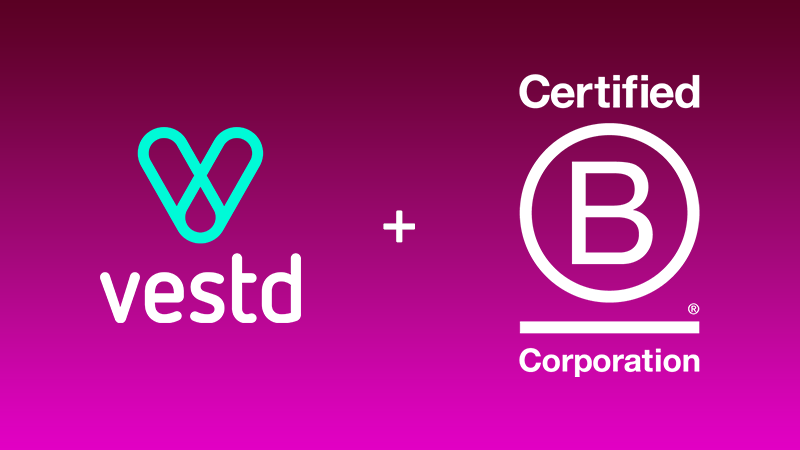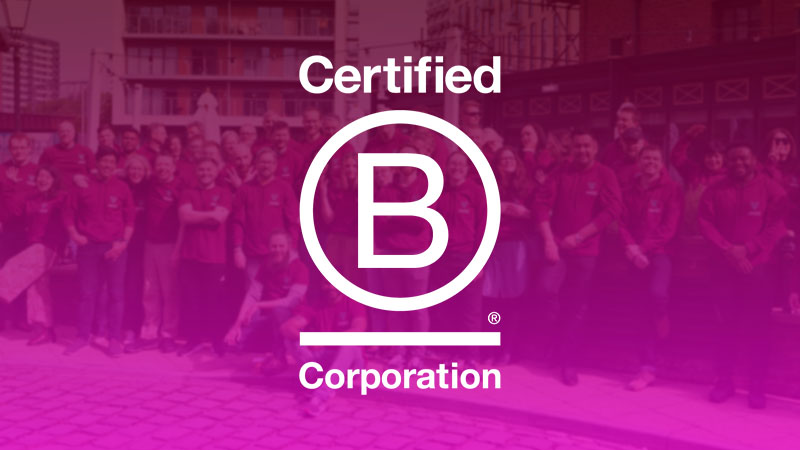Vestd announces B Corp status
The UK’s favourite sharetech platform joins the growing movement of companies using business as a force for good.
Manage your equity and shareholders
Share schemes & options
Equity management
Migrate to Vestd
Company valuations
Fundraising
Launch funds, evalute deals & invest
Special Purpose Vehicles (SPV)
Manage your portfolio
Model future scenarios
Powerful tools and five-star support
Employee share schemes
Predictable pricing and no hidden charges
For startups
For scaleups & SMEs
For larger companies
Ideas, insight and tools to help you grow
Last updated: 19 February 2025.
Meeting environmental, social, and governance (ESG) goals is no longer a box-ticking exercise. Studies show that high ESG-rated businesses often outpace competitors in terms of value and growth.
Not only that but there's increasing demand from the millennial and Gen Z workforce for employers to take action.
However, there is much debate surrounding what ESG even is, and who or what judges the ESG credibility of a business:
B Lab is attempting to resolve these issues.
Founded in 2006, B Lab is a non-profit organisation and movement that provides “B Corp Certification” to businesses demonstrating their social and environmental performance.
So, what does becoming a B Corp mean? And what's the benefit?
B Corps are for-profit companies certified by the non-profit organisation B Lab.
B Lab authenticates businesses for meeting various social and environmental performance, transparency, and accountability targets. B Lab has global influence and partnered with the UN to help facilitate the Sustainable Development Goals (SDGs).
When we first published this blog back in 2022, there were around 4,600 B Corps in 78 countries across 155 industries, including 700 in the UK.
Today, there are 9,400 B Corps worldwide, with 2,500 of those in the UK alone. The vast majority are small-to-medium-sized businesses, and we're proud to say that we're now one of them!
Public demand for business accountability has fuelled interest in B Corps. Today, there are many recognisable business brands and names with B Corp status, including:
As we can see, there are B Corps in almost every sector ranging from banking and financial services (Coutts & Co) to clothing (Patagonia), food and drink (BrewDog), chemical engineering (Novamont) and digital services (Crowdcube).
Big shout-out to our customers who are also B Corps - kudos!
We’re deep into the era of ESG, and evidence consistently shows that high ESG-rated businesses often outperform competitors across several KPIs, such as growth, talent acquisition, retention, and investment performance.
Investing in social and environmental responsibility improves company culture, which boosts employee engagement and cuts recruitment costs. In addition, evidence suggests that investors, customers and clients are actively engaging with those who take ESG seriously.
B Corp Certification offers a means to demonstrate ESG credibility in a meaningful way.
B Lab has produced its own research on the benefits of being certified - their 2021 study of UK SMEs found that B Corp status delivered the following benefits:
B Corps saw an average growth of 26% between 2017 and 2020 vs the average for all UK companies of 5%. They also have higher expectations for future growth compared to non-B Corps.
B Corp status helps businesses win the ‘talent war’ by exhibiting their social and environmental responsibility. Annual headcount growth between 2018 and 2021 was 14% for B Corps vs just 1% for all companies.
This also applies to employee attrition, as just 8% of employees were lost for B Corps in 2021 compared to a general average of 16 to 20%.
84% of B Corp leadership teams included at least one woman compared to 55% generally, and the average gender pay gap was also less at 4% vs 15%.
43% of B Corps applied for or received R&D tax credits between 2018 and 2021 vs a general average of 6%.
70% of B Corps seeking equity financing in 2021 secured their target finance vs 56% of all SMEs.
74% of B Corps had a formal business plan, compared to 41% generally. In addition, 84% had formal processes to track business performance vs 52% generally.
Businesses unlock many of these benefits by altering their structure and relationships with suppliers, clients, workers, employees, stakeholders, etc.
B Corp Certification is about the process as well as the result. Most of the benefits of becoming a B Corp are discovered in the assessment process, which prompts businesses to be introspective and question, “are we really doing the best job we can?”
In essence, the path to B Corp status provokes a fact-finding mission that helps futureproof the business. So, what does the process involve?
The exact process depends on how large the business is, which is why it's worth checking the eligibility requirements before doing anything else. But the backbone of the certification process is the B Impact Assessment (BIA).
It's a free and confidential online tool that anyone can use to measure their company's impact on the world around them.
Among other things, companies will need to prove that the business has been trading for at least 12 months. Businesses that haven't been trading for that long but want to start incorporating B Corp practices can apply for pending B Corp status.
In terms of how long the process takes, it depends on the size and nature of the business. For instance, it took Vestd just over 12 months. While rumour has it, it took Candy Kittens roughly three years. (No shade, by the way, it just goes to show that it's a marathon, not a sprint).
The BIA contains about 200-300 questions and covers five key areas:
Business governance must become less focused on shareholder primacy and profit maximisation at all costs. This involves increased transparency and financial information disclosure.
B Corps deliver greater opportunities for career development, workplace wellness and ownership.
Employee ownership and empowerment play a major role in B Corp Certification, with emphasis on the benefits of share options and shared ownership.
B Corps must take on greater civic/community engagement, emphasising diversity and inclusion, charitable giving, supply chain risk management, poverty alleviation, and locally focused economic development.
Businesses are evaluated on their environmental management plans and policies, e.g. recycling, water, waste and energy usage. Use of renewable energy, providing environmental education, engaging with environmental groups, etc, are all considered.
Providing quality products, aftercare, communication, transparent customer data usage and delivering social impact for customer groups are addressed.
The BIA is by no means a quick task! However, if a business scores 80 points or more, whoever completed it can then start the B Corp review process.
80 may not sound challenging, but few companies achieve this score on the first attempt. But this isn't the end of the world, if anything, it's seen as part of the process.
Our team found that with many of the BIA questions they'd answer, more sub-questions would appear (of course requiring the collection of further evidence!). But it was all worth it in the end.
Side note: all B Corps must renew their B Corp certification every three years, so they ought to keep an eye on all five areas.
While B Corp status has no legal ramifications unto itself, it does require businesses to make certain amendments to their constitutional structure.
In the UK, B Corps must copy text into their Articles of Association to transfer emphasis from shareholder primacy to more holistic, all-encompassing stakeholder governance that benefits customers, workers, suppliers, communities, investors, and the environment.
Amendments to the Articles of Association include:
Obtaining B Corp Certification has been described as “the highest standard for socially responsible businesses”, and although the process may seem rather laborious, the benefits are hard to refute.
Startup Consultant Amber Nasir was one of the key people we have to thank for our entry into the B Corp community. Her advice?
"Be prepared to be in it for the long haul; the BIA will take longer than you think! Identify who in the business you need to collect evidence from and set aside time to align with them. Use collaborative tools like Google Docs/Sheets to collate your findings.
And don't be discouraged if you don't pass first time (most businesses don't) and the team can help you understand where and how changes can be made.
"If any startup founders out there are interested in becoming a B Corp, let's have a chat and I can give you the lowdown!"
One of the defining roles of a B Corp is delivering impact and inclusion through innovative ownership structures. Ideally, B Lab would like 40% of the business to be owned by non-executive employees.
B Lab highlights some of the following pathways to diversified ownership:
Offering equity in the form of an employee share scheme is a superb way of incentivising employees while investing in the future of a business and benefitting from its success.
Share schemes provide many benefits of their own. For example, 95% of Vestd customers said that their share scheme actively helped them improve employee loyalty.
That's probably aided by the increased shareholder transparency. Digitisting a share scheme makes equity rewards feel more real, more tangible.
But that ownership element is also a vital piece of the puzzle for any business seeking B Corp Certification.
__
Whether or not you decide to go down the B Corp route, a company share scheme is certainly worth exploring. Download our free guide or book a free consultation today to get started.

The UK’s favourite sharetech platform joins the growing movement of companies using business as a force for good.

We are delighted to announce that Vestd is now a Certified B Corporation!

Sustainability. How often do we hear this word? It’s something that is mentioned in the boardroom and in many a marketing campaign on a daily basis....
